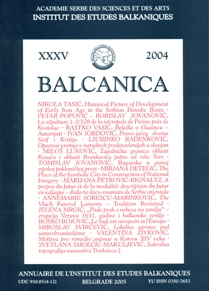Uloga simboličkog grada u stvaranju predstava o naciji
The Place of the Symbolic City in Construction of National Imagery
Author(s): Mirjana DetelićSubject(s): Customs / Folklore
Published by: Balkanološki institut - Srpska akademija nauka i umetnosti
Keywords: symbolic city; oral epic tradition; epic songs; Balkan;
Summary/Abstract: This article is based on folklore studies of oral epic tradition in the Serbo-Croat (or, depending on territory, Croat-Serbian) language which was common to the majority of former Yugoslavia population (in fact, all but Slovenes and Macedonians).1 The corpus of 1200 oral epic songs2 were chosen among other folklore genres because of their strong ideological position which made them the only form of oral literature where town appears as a human habitation clearly de.ned in time and space. In all other forms of traditional culture, the urban space is imagined and represented either as a miraculous or el.n place (as in fairy-tales, ritual poetry, short literary forms, et al), or as a notion with a name but without a content (as in etiological and other legends).3 In contrast, the epic poetry builds the image of urban space as a centre of power and earthly rule, equating the very concept of potency of ‘state’ with the number of a state’s towns and cities. In the epic poetry only - because it deals with ethic, social, and political norms as they e.ect (and a.ect) the complex relationship between the state, its ruler, religion, and nation - urban spaces are modeled as places with structure, important enough to go to war for. This is always so in the South Slav material where politics and religion are intertwined more than they should be, causing and caused by permanent Christian-Muslim clashes and truces. As recent war experience in the Balkans shows, the latter sense of the term ‘town’ in particular persists, giving rise to circumstances of the greatest risk for the survival of culture – traditional or other.
Journal: BALCANICA
- Issue Year: 2004
- Issue No: 35
- Page Range: 171-185
- Page Count: 14
- Language: English

